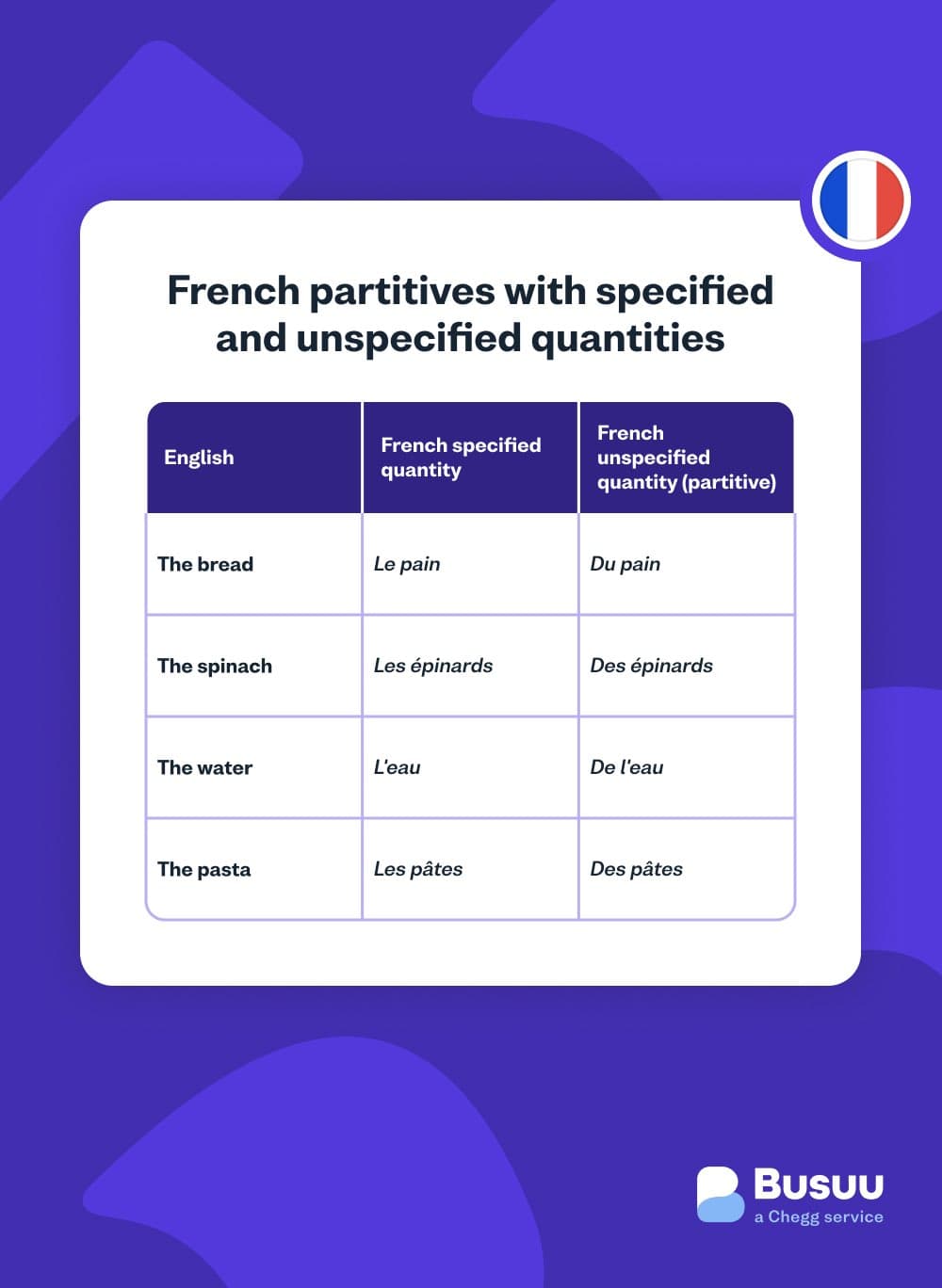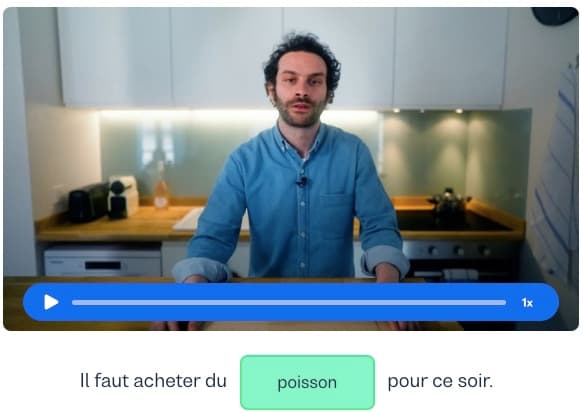I want to learn...
Partitive articles in French are quite fascinating. They denote an undefined quantity of something, usually related to food, liquids, or other uncountable nouns. In English, we often translate them as "some" or "any." Sometimes, we just omit them. Understanding partitive articles is an important step towards mastering the French language.
Specified quantity
A specified quantity in French refers to a specific amount of a noun. This is a countable noun (like a book, cat, or table) or an uncountable noun (like bread, water, or sugar) when a specific quantity is mentioned.
When you're talking about a specific amount or a defined number of items in French, you generally use the definite articles: le for masculine singular nouns, la for feminine singular nouns, l' for nouns beginning with a vowel or with an "h" (regardless of gender), and les for plural nouns, regardless of gender.
Unspecified quantity (partitive)
An unspecified quantity refers to an unknown or unspecified amount of a noun. You find this used with uncountable nouns like food, drink, or abstract concepts.
The partitive articles in French, du for masculine singular nouns, de la for feminine singular nouns, de l' for singular nouns beginning with a vowel or an "h" (regardless of gender), and des for plural nouns, are used when the exact quantity is not specified or when you are talking about a part of something in general. This often translates to "some" or "any" in English, or sometimes, it's just left out.

Specified and unspecified quantities compared
| English | French Specified Quantity | French Unspecified Quantity (Partitive) |
|---|---|---|
| The bread | Le pain | Du pain |
| The spinach | Les épinards | Des épinards |
| The water | L'eau | De l'eau |
| The pasta | Les pâtes | Des pâtes |
French partitive articles
Partitive articles in French are used to express unspecified quantities, much like "some" or "any" in English. They're called "partitive articles" because they indicate a part of something, not the whole thing.
These articles are usually used with uncountable items, especially food and drinks. Unlike definite and indefinite articles, they do not indicate a specific quantity.
1. Masculine singular:du is used for masculine nouns.
For example, du pain means "some bread" or simply "bread.”
2. Feminine singular:de la is used for feminine nouns.
For example, de la confiture means "some jam" or simply "jam.”
3. Singular nouns that start with a vowel or h:de l' is used to prevent the clash of two vowels.
For example, de l'eau means "some water" or simply "water.”
4. Plural:desis used for plural nouns, regardless of gender.
For example, des pommes means "some apples" or simply "apples.”
French partitive articles
| Masculine Singular | Feminine Singular | Singular + a / e / i / o / u / h | Plural |
|---|---|---|---|
| du | de la | de l' | des |
French partitive articles are used with uncountable nouns like pain (bread), eau (water), argent (money) and more. They are placed directly in front of a noun, and they agree with the noun in number and sometimes gender.
Negation
It's important to note that after a negation, du, de la, and des become de or d' regardless of the gender and number of the noun.
Examples of negations
| Positive Sentence | Translation | Negative Sentence | Translation |
|---|---|---|---|
| Je veux du pain. | I want some bread. | Je ne veux pas de pain. | I don't want any bread. |
| Elle mange de la viande. | She eats some meat. | Elle ne mange pas de viande. | She doesn't eat any meat. |
| Nous avons des amis. | We have some friends. | Nous n'avons pas d'amis. | We don't have any friends. |
Examples of using partitive articles
1. With an uncountable noun:
Tu as du courage. (You have some courage.)
Elle veut de l'argent. (She wants some money.)
Nous avons de la patience. (We have some patience.)
Ils achètent du pain. (They're buying some bread.)
J'ai de la chance. (I'm lucky.)
2. With a specific quantity of something:
Je voudrais du café. (I would like some coffee.)
Elle boit de la bière. (She drinks some beer.)
Ils mangent de la viande. (They eat some meat.)
Nous achetons des légumes. (We're buying some vegetables.)
J'ai acheté des livres. (I bought some books.)
3. After a negation:
Je n'ai pas de frères. (I don’t have any brothers.)
Elle ne mange pas de viande. (She doesn't eat any meat.)
Nous n'avons pas d'idées. (We don't have any ideas.)
Tu n'as pas de patience. (You don't have any patience.)
Il ne boit pas de lait. (He doesn't drink any milk.)
French partitive articles: Recap
The French language uses partitive articles to refer to an unspecified quantity of something. These are used with both tangible items like "bread" or "meat" and intangible ideas such as "patience" or "courage".
The partitive articles in French, du, de la, des, and de l', are equivalent to the English "some" or "any". The choice between these partitive articles depends on the gender and the number of the noun it precedes. The choice also depends on whether or not the noun starts with a vowel or a silent h.
Note the change that occurs in negative sentences. Even though du, de la, and des are used in positive sentences. In negative sentences, these all change to de or d', regardless of the gender or quantity of the noun.
Understanding and using partitive articles correctly is an important step to mastering French. It helps you make your French sound more natural and fluent.
Remember, learning a language is a gradual process. Do not get discouraged if you make mistakes or find certain aspects challenging. Over time, with consistent practice you'll become more comfortable with these and other aspects of the French language.
Newlanguages


